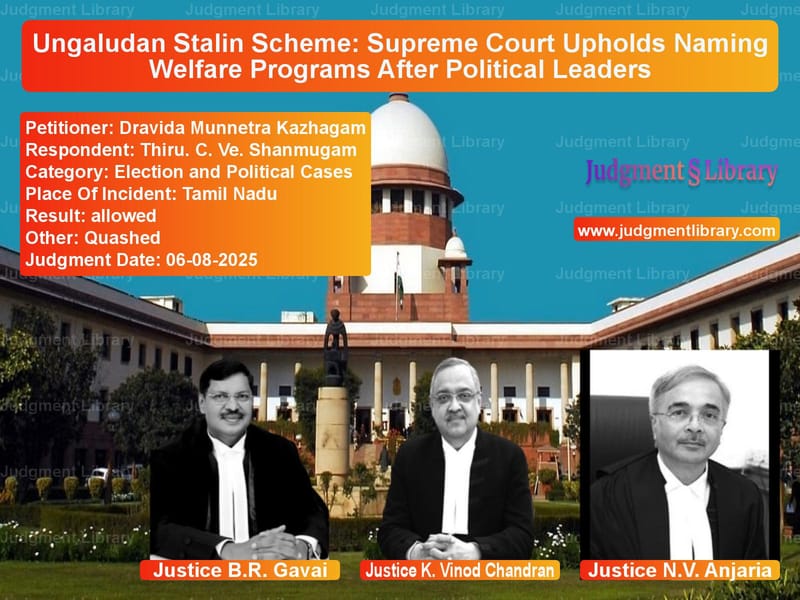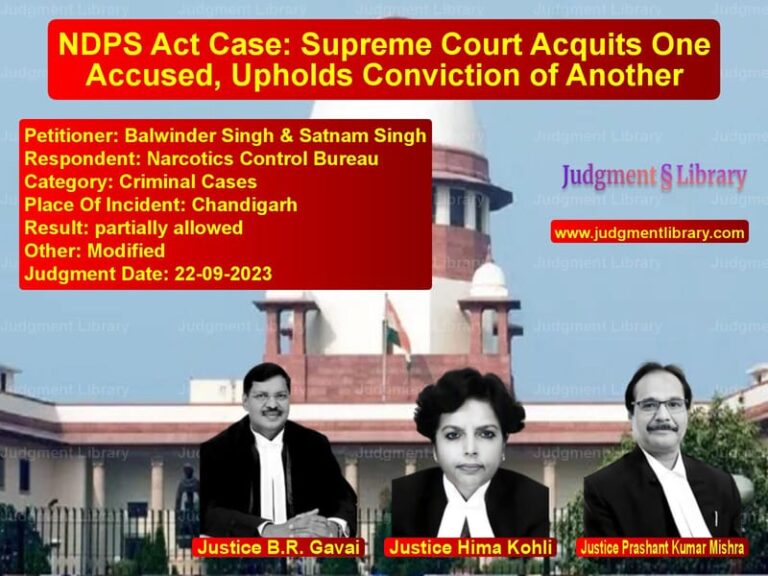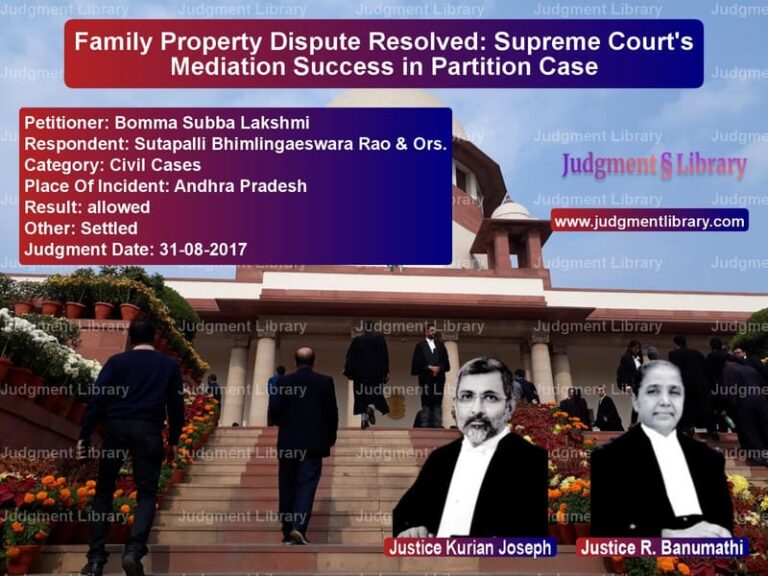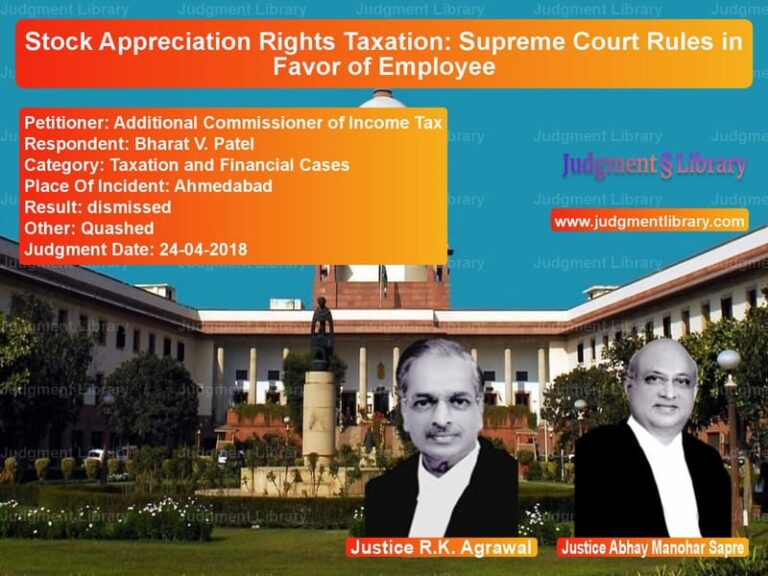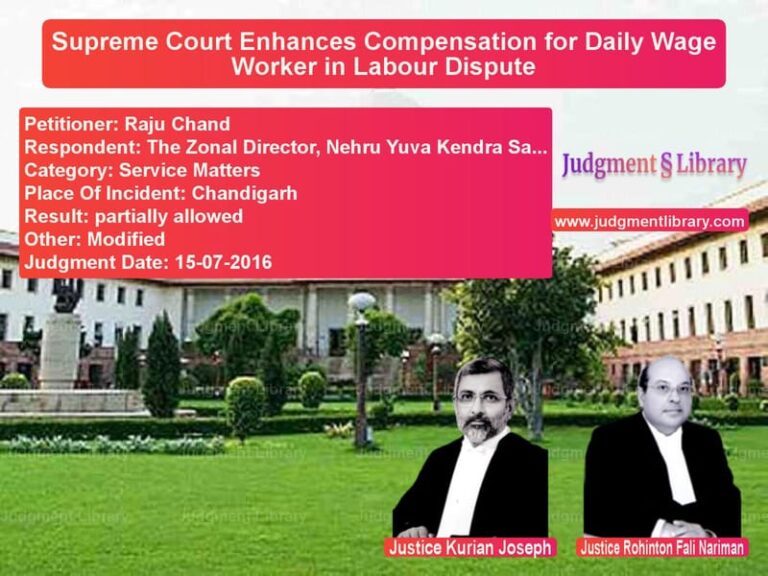Ungaludan Stalin Scheme: Supreme Court Upholds Naming Welfare Programs After Political Leaders
In a significant judgment that addresses the intersection of politics and governance, the Supreme Court of India has delivered a landmark verdict upholding the right of state governments to name welfare schemes after political leaders. The case emerged from Tamil Nadu where the Dravida Munnetra Kazhagam (DMK) government’s “Ungaludan Stalin” scheme faced legal challenges from opposition leader Thiru C. Ve. Shanmugam, who argued that using the Chief Minister’s name in government schemes amounted to misuse of public funds for political glorification.
The legal battle began when the Tamil Nadu government issued Notification G.O. (Ms) No.390 on June 19, 2025, launching the “Ungaludan Stalin” scheme, which translates to “Your’s Stalin” in English. The scheme was designed to address the challenges citizens face in accessing various government welfare programs due to lack of information, difficulty understanding procedures, and technological barriers. It proposed conducting 10,000 camps across the state where volunteers would visit households, explain available schemes, help with applications, and ensure eligible citizens could access benefits.
The Legal Challenge
Thiru C. Ve. Shanmugam, a sitting Member of Parliament from an opposition party, filed a complaint with the Election Commission of India on July 18, 2025, under Clause 16A of the Election Symbols (Reservation and Allotment) Order, 1968. Just three days later, without waiting for the ECI’s response, he approached the Madras High Court through a writ petition. The High Court’s Division Bench passed an interim order on July 31, 2025, directing that while implementing welfare schemes, the government should not include “the names of any living personality, photograph of any former Chief Minister/ideological leaders or party insignia/emblem/flag of appellant (Dravida Munnetra Kazhagam).”
The state government and DMK party appealed this interim order to the Supreme Court, arguing that the High Court had passed the order without giving them adequate opportunity to present their case. The Supreme Court took the unusual step of withdrawing the entire writ petition from the High Court and hearing it along with the appeals.
The Arguments Presented
Senior counsel Mukul Rohatgi, representing DMK, made a compelling argument that “none of the judgments of this Court in Common Cause vs. Union of India, Common Cause vs. Union of India, State of Karnataka vs. Common Cause and Others and Centre for Public Interest Litigation vs. Kewal Kumar Sharma and Others prohibit a scheme to be named after a political leader.” He further elaborated that “the judgments/orders passed by this Court from Common Cause I to Common Cause IV, have been diluted and now the photographs of not only the Hon’ble President, the Prime Minister, the Governor, the Chief Ministers are permitted to be printed in the advertisements, but also the photographs of the Cabinet Ministers of the concerned departments.”
Dr. A.M. Singhvi, representing the Tamil Nadu government, presented a list of 45 schemes from various state governments across India that were named after political leaders, demonstrating that this was a common practice throughout the country. The Supreme Court, however, chose not to specifically name these schemes “in order to avoid any embarrassment to any political party.”
Opposing these arguments, senior counsel Maninder Singh representing the original petitioner relied heavily on the Common Cause judgments, particularly Common Cause II. He argued that “the cumulative effect of all the four judgments in Common Cause I, Common Cause II, Common Cause III and Common Cause IV would show that this Court has frowned upon personal glorification of any political leader, it has also frowned upon using of public funds for glorifying a person in office.” He specifically referenced the guidelines framed by the Madhava Menon Committee, particularly paragraph 4 which states that “the possibility of any misuse of public funds on advertisement campaigns in order to gain political mileage by the political establishment has to be totally excluded.”
The Supreme Court’s Analysis
The Supreme Court, in a judgment delivered by Chief Justice B.R. Gavai with Justices K. Vinod Chandran and N.V. Anjaria concurring, took a strong stance against what it perceived as selective targeting and misuse of judicial process. The Court made several crucial observations that formed the basis of its decision.
Addressing the petitioner’s selective approach, the Court noted: “When such schemes are floated in the name of leaders of all the political parties, we do not appreciate the anxiety of the writ petitioner to choose only one political party and one political leader. If the writ petitioner was so concerned about the misuse of public funds by the political parties, the writ petitioner would have made a challenge to all such schemes across the Country. However, singling out only one scheme by one political party in the name of one political leader, smacks about the motives of the writ petitioner.”
The Court was particularly critical of the hurried manner in which the petitioner approached the High Court. It observed: “A representation/complaint was made before the ECI on 18th of July, 2025. Whether such a representation is tenable or not, itself, is a debatable question… In any case, even without giving an opportunity to the ECI to decide the said representation, the writ petitioner had rushed to the High Court on 21st July, 2025, i.e., within three days of making the representation.”
The Court specifically quoted from the petitioner’s own writ petition where he stated: “In light of the respondent’s failure to act on the representation and the continuing violation of legal and constitutional principles, I am left with no choice but to approach this Hon’ble Court for appropriate reliefs. The issues raised in the present Writ Petitions concern larger questions of governance ethics and democratic fairness.” The Court remarked that “Not giving even a breathing period to the ECI and making such statements with regard to the Commission’s failure to act on the representation within a reasonable period, the writ petitioner, in our view, has also tried to castigate the ECI.”
Broader Principles and Final Ruling
The Supreme Court reiterated an important constitutional principle that “Time and again we have observed that the political battles should be fought before the electorate. At the cost of repetition, we observe that the Courts should not be used to settle the political scores between the rival political parties.”
In its concluding remarks, the Court was unequivocal in its condemnation of the petition: “We are, therefore, of the considered view that the Writ Petition itself was not only misconceived in law, but also totally an abuse of the process of law.”
The Court allowed the appeals and quashed the High Court’s interim order. More significantly, it dismissed the original writ petition with costs of ₹10 lakh, to be deposited with the State of Tamil Nadu within one week. The Court directed that “On deposit of the said amount, the State shall use it only for the purposes of implementation of any of the welfare schemes floated for the underprivileged in the State.” The judgment also contained a stern warning that “On failure to deposit the cost within a period of one week, as aforesaid, the writ petitioner would be liable to be proceeded against for having committed the Contempt of this Court.”
Implications of the Judgment
This judgment has significant implications for Indian politics and governance. By upholding the practice of naming welfare schemes after political leaders, the Supreme Court has acknowledged the reality of Indian political culture where governments frequently name programs after their prominent leaders. The judgment recognizes that such naming conventions, when applied uniformly across political parties, do not necessarily constitute misuse of public funds.
The Court’s strong stance against selective litigation and its imposition of heavy costs sends a clear message that courts should not become battlegrounds for political rivalries. The judgment reinforces the principle that political differences should primarily be resolved through democratic processes rather than judicial interventions, unless there are clear violations of constitutional principles.
The decision also clarifies the scope of the Common Cause judgments, indicating that while they regulate the use of photographs in government advertisements, they do not prohibit the naming of schemes after political leaders. This distinction is important for understanding the boundaries between legitimate political expression and improper use of public resources for political gain.
For state governments across India, this judgment provides clarity and confidence to continue naming welfare schemes after political leaders, a practice that has become deeply embedded in Indian political discourse. However, the underlying principles of the Common Cause judgments regarding the use of public funds for political glorification remain valid, and governments must still exercise caution to ensure that welfare schemes primarily serve public interest rather than political objectives.
Petitioner Name: Dravida Munnetra Kazhagam.Respondent Name: Thiru. C. Ve. Shanmugam.Judgment By: Justice B.R. Gavai, Justice K. Vinod Chandran, Justice N.V. Anjaria.Place Of Incident: Tamil Nadu.Judgment Date: 06-08-2025.Result: allowed.
Don’t miss out on the full details! Download the complete judgment in PDF format below and gain valuable insights instantly!
Download Judgment: dravida-munnetra-kaz-vs-thiru.-c.-ve.-shanmu-supreme-court-of-india-judgment-dated-06-08-2025.pdf
Directly Download Judgment: Directly download this Judgment
See all petitions in Public Interest Litigation
See all petitions in Constitution Interpretation
See all petitions in Judicial Review
See all petitions in Judgment by B R Gavai
See all petitions in Judgment by K. Vinod Chandran
See all petitions in Judgment by N.V. Anjaria
See all petitions in allowed
See all petitions in Quashed
See all petitions in supreme court of India judgments August 2025
See all petitions in 2025 judgments
See all posts in Election and Political Cases Category
See all allowed petitions in Election and Political Cases Category
See all Dismissed petitions in Election and Political Cases Category
See all partially allowed petitions in Election and Political Cases Category

